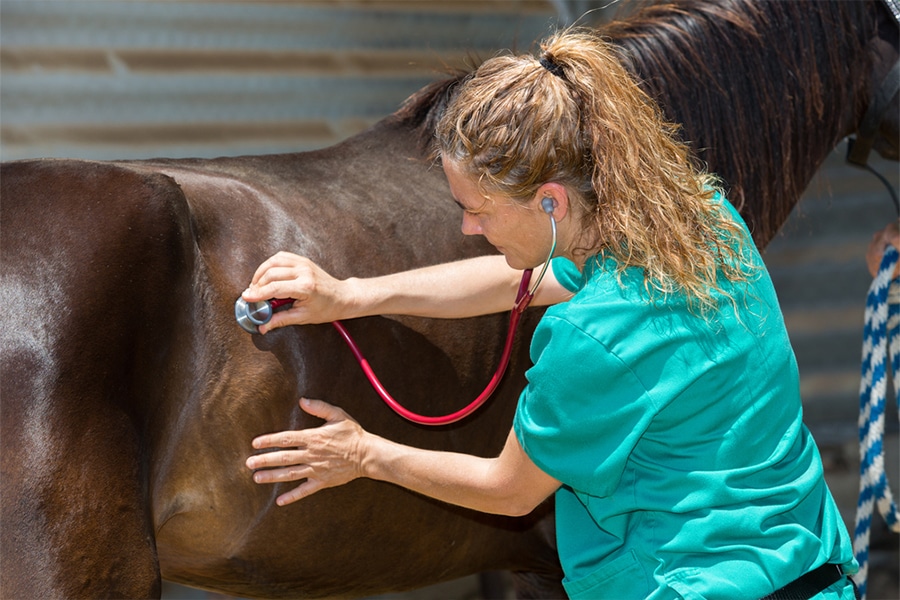
Stomach Ulcers in Horses
Does my horse have stomach ulcers?
Well if you own a performance horse or race horse chances are yes they do! It’s now pretty well known that 60-90% of horses in work these days have ulcers in some form. Why is it so high? That’s because we have changed the natural habitation of our herbivore friends and they have gone from naturally grazing animals to sport horses that get stabled, transported and ridden with many periods of time without roughage in their stomach. The most common form of gastric ulceration (and the one which we will talk about here today) is commonly coined “Equine Gastric Ulcer Syndrome” or Primary Squamous Ulceration. There is another form which affects the glandular portion of the stomach which is most commonly caused by phenylbutazone administration.
How does it happen?
So we have this amazing giant herbivore producing litres of acid every hour into it’s stomach with the idea that there is food constantly coming in. When a horse takes a bite of grass or hay or other forage they chew side to side, mix the food around with delicious saliva containing bicarbonate and then it gets swallowed down the oesophagus and into the stomach. This act of chewing and saliva mixing is an important process to not only help break down the food but to add the buffering agent of bicarbonate to help protect the lining of the stomach.
Now. Let’s take away this yummy forage and put our horses in a float or truck and travel for 3 hours to a show, spend a few hours grooming, fluffing and making them look pretty, we then head out for a jumping round or dressage test. We now have a very empty stomach constantly producing acid, very little buffer coming down to help neutralise things, and then we get our horses to run around which causes splashing of the acid from the protected part of the stomach to the non-protected part.
We do this enough times and that acid splashing causes damage to the squamous cells, which is the lining of the upper portion of the stomach and ultimately leads to erosion and ulceration. Hey Presto! We now have gastric ulcers
Now I’m not saying you shouldn’t do any of these activities with our horses, not at all. But we need to be very mindful of what we do, when and how we do it so we can care for our big furry beasts in the best way possible.
How do I know my horse has ulcers?
Ulcer signs aren’t necessarily very specific, and some horses are quite staunch and will barely show any at all despite how bad they might be. They could show a change in temperament, start being picky with food or not want it at all. There may be higher levels of fatigue or poor performance. They may show abdominal sensitivity when brushed, especially around the girth area. They could have diarrhoea, poor coat condition or just seem a bit “off”.
There has been a big movement lately to diagnose ulcers on the basis of acupuncture points. I think this is a helpful tool, but just bare in mind it’s not a definitive diagnostic and you need to take the whole picture into account.
To accurately diagnose ulcers you need to organise an endoscopic procedure with your vet. This allows a camera to go down and have a proper look at the stomach and assess if there are ulcers present, in which section of the stomach they are and what grade or how bad they are. If your horse is presenting symptoms for the first time you may consider skipping this step and going straight to treatment, however more than once and I would strongly suggest getting the scoping procedure done.
There are currently no blood markers to diagnose ulcers – however if the ulcers are significant or chronic you will likely see some reduction in red blood cells, low protein levels, and an increase in inflammatory factors.
Risk Factors for Ulcers
- Exercise intensity
- Intermittant vs continuous feeding
- Diet – a diet high in grains has been implicated in causing ulcers. Lucerne chaff and hay has been shown to lower the pH and thus the acidity in the stomach and also provide protective effect by buffering gastric juice pH
- Stall confinement – this can be a risk factor, but not always – it is probably more individual to the horse and whether they are comfortable there, whether they eat etc – need to be mindful of each individual horse and how they behave in the stable environment
- Stress – if you have a horse that paces the fence-line or generally gets anxious about things they can definitely be prone to getting ulcers, a long with the fact that they’re spending periods of time not eating, they have an increase in stress hormones that decrease the pH in the stomach (making it more acidic)
So my horse has ulcers now what?
Drug therapy is still the mainstay treatment of ulcers, however, diet and nutritional management provide long-term solutions to reduce the risk of recurrence and complications. Without altering the stress-factors that caused ulceration in the first place, the ulcers will quickly return especially if your horse is maintained in training
The current drug of choice is Omeprazole (Gastropell Daily, Gastropell Forte, Ulcershield, Cale Gastro) which is given at full dose for 30 days, then reduced over a period of 2-4 weeks depending on the severity. Horses that are very prone to ulcers may require a preventative dose for a longer period or at least during competition times. The Gastropell Daily and Cale Gastro are both over the counter products that you can purchase without a vet prescription. The Gastropell Forte and Ulcersheild are higher in concentration and require a script in order to purchase them
How do I stop the ulcers returning?
Ultimately we need to reduce that acid load in the stomach. We need to ensure our horses are grazing or munching on hay as much as they can so they are constantly placing forage in their stomach to buffer the acid. If you are travelling or heading to a competition lucerne chaff and hay should be your best friend. The high concentration of calcium in these products have been shown to be very effective in reducing the acid load. Feeding a few handfuls of Lucerne chaff prior to riding gives them a protective matting to help stop acid splashback. If your horse gets a bit stressed in a stable or yard situation, then they definitely need to be turned out to graze more often. Reducing or eliminating altogether grains and high starch concentrated feeds is very helpful as these lead to a higher pH in the stomach and are also eaten a lot faster and don’t stay in the stomach as long. Just remember – the longer your horse doesn’t have food or a buffer in their stomach, the more acid is being produced that can cause harmful affects.
Are there supplements I can use?
There are some supplements on the market now that can help with prevention on an ongoing basis. However just bare in mind if you’re not getting to the route cause of the ulcers then they may not work – use them as part of your ongoing management plan. A great supplement we currently have is the KER Neigh-Lox.

STILL HAVE QUESTIONS ON THIS TOPIC?
Call us on: 021 838 746 (Monday to Friday 9.00am to 5.00pm)
Email us at: [email protected]
Why shop online with us?

Discounted Prescription Medicine
VetPost offers easy & affordable pet medication for a happier, healthier pet.

New Zealand Owned & Operated since 2014
Guaranteed quality and service with VetPost, our vet Dr Rebecca Penman is always here to help.

Shop online, anytime.
Our products, services & specials are all at your fingertips. Buy online, delivered straight to your door.
